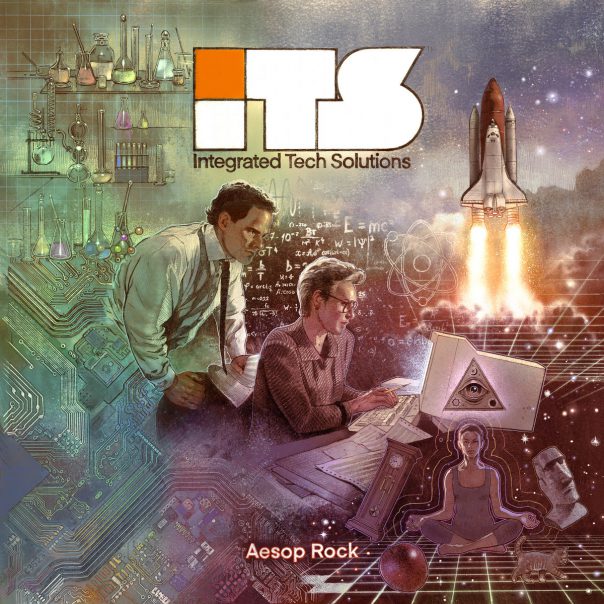ALBUM REVIEW: Aesop Rock enters the matrix on ‘Integrated Tech Solutions’

Aesop Rock, “Integrated Tech Solutions.”
For however many albums Aesop Rock has released in the month of November, you’d think he’d lean into it and try to create his own holiday. The solitary wordsmith returns to share his observations and anxieties regarding humankind’s relationship to technology in our daily lives on sept album Integrated Tech Solutions.
Integrated Tech Solutions
Aesop Rock
Rhymesayers, Nov. 10
7/10
Get the album on Amazon Music.
With songs like “Kyanite Toothpick” (featuring Bay Area native Hanni El Khatib), the album also examines how increasingly corporatized our lives have become as we’re encouraged to consume more and more. But as it goes on, the focus becomes lost here and there with songs only tangentially related or not related at all.
Luckily the beats and the rhymes are still top notch.
The album opens with a skit, “The ITS Way,” with a heavy ’80s stylized synth melody. Aesop Rock delivers an advertisement courtesy of a fictional corporation that consistently interjects throughout the album. It has a retro cyberpunk quality, evocative of Paul Verhoeven’s “Robocop.”
Single “Mindful Solutionism” kicks off with an 8-bit instrumental of abrasive snares and a beefy bass line. Aesop explores the evolution of humanity in tandem with the technologies we’ve created over centuries. It eventually leads to the conclusion that for every one made for functionality, there’s another for destruction. The duality isn’t balanced; weaponization and convenience overpower improving quality of life.
The grimy percussion, harmonized synth tones and electric guitar strums on “Infinity Fill Goose Down” have Aesop Rock talking about navigating the underground rap industry, drawing thematic comparisons to farming. On electronic instrumental “Living Curfew,” Aesop and MC Billy Woods explore how time and destruction seem to go hand in hand.
The first signs of sidetracking come on “Pigeonometry,” where Aesop raps about his fondness for pigeons and how they’ve adapted to live among people as we corrupted the natural world. Aesop dedicates an entire verse comparing himself to Leonardo DaVinci, wondering how others will view his own impact in the future.
Then on “100 Feet Tall,” another synth-led instrumental, Aesop Rock goes back to his childhood, telling a story of meeting Mr. T in a New York restaurant. The song is an examination of how prone we are to see figures in the media as larger than life, when they’re still very normal people.
“Salt and Pepper Squid” features a low electric guitar and bass pairing as Aesop raps about how working as an independent artist requires him to live modestly. It’s followed by “Time Moves Differently Here,” which sees him order an ungodly amount of food in a drive-through. It reminded me of similar bit from sketch show “I Think You Should Leave with Tim Robinson,” and the song would’ve probably fit better on Aes’ 2021 album, Garbology.
A heavy bass riff and echoing snares highlight “Aggressive Steven,” a true story about a man having a manic episode who broke into Aesop’s place and trashed it. When the police are called, he finds himself appalled that they want him to press charges. Aes muses how poorly the mentally ill are treated, either getting locked up or thrown onto the street. Its a deeply sobering track. So is “Bermuda,” a meditation on death with Lealani Teano belting out over washed-out vocals.
“By The River” has Aesop comparing a river to society over a smooth, jazzy melody with trumpets, soft synths and a steady bass line. “All City Nerve Map” kicks off with a piano and guitar duet that’s interrupted by a warping synth instrumental. Aesop describes how he’s memorized the layout of his home by the stimuli and the emotional qualities each part evokes.
“Forward Compatibility Engine” features the return of Rob Sonic, with whom Aesop Rock collaborated under the name Hail Mary Mallon. The two rap over an electric guitar melody as snares are steadily replaced with claps. On spoken-word piece “On Failure,” Aes ponders the fate of Vincent Van Gogh. He questions the validity of calling the man a failure for having died impoverished and unknown during his life. It isn’t hard to see that Aesop clearly feels a kinship with the painter.
“Solid Gold” delivers another excellent grimy instrumental that lets Aesop assert his lyrical prowess and dominance. It’s like he unleashed a rabid animal on the mic.
Penultimate track “Vititus” has piano chords transitioning into synths with bass and snare following suit. Aesop Rock shares memories of his grandmother, who emigrated from Lithuania; her home, cooking and her love for the family. The song concludes with Aesop getting the news of her passing. Singer Nikki Jean joins in on closer “Black Snow,” on which Aesop raps about what it’s like to live both remote and alone.
Integrated Tech Solutions is a great album that features Aes’ signature elements. The album’s thesis is undermined by the tangental turns, but that doesn’t detract from the quality of the music or the writing.
Follow hip-hop critic Tim Hoffman at Twitter.com/hipsterp0tamus.
